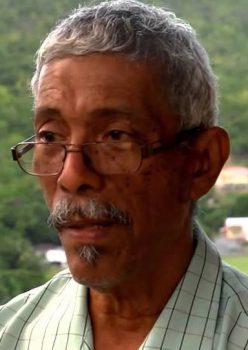There is a substantial body of work by a writer who was one of St Lucia’s most outstanding dramatists and who was quite dominant among West Indian playwrights throughout the 1960s into the 1970s. His plays are widely published, they were in demand and have been consistently performed all around the Caribbean. This dramatist was at one time very prominent and active in the St Lucia Arts Guild. Yet he is hardly ever heard of, no one mentions him and there have recently been no noises raised in his memory.
 There are many reasons why he should be famous, yet the primary one of those reasons is the main cause of his relegation. Roderick Walcott (1930 – 2000), foremost St Lucian and Caribbean playwright, is the forgotten Walcott.
There are many reasons why he should be famous, yet the primary one of those reasons is the main cause of his relegation. Roderick Walcott (1930 – 2000), foremost St Lucian and Caribbean playwright, is the forgotten Walcott.
There is every reason to celebrate him: he was the brother of the greatest poet in world literature today. Yet, for that very reason he has been overshadowed and existed as the pale light next to his illustrious brother. Roderick was the twin brother of Derek Walcott.
In dedicating one of his publications to his brother, Derek described him as being long “engaged in the same endeavour”. That endeavour is the theatre – they were both playwrights, directors, critical essayists and activists in drama, yet Derek rose such to prominent heights and so dominated the world’s spotlight, that Roderick was relatively forgotten as the other Walcott.
Perhaps not surprising for twin brothers, they were very much alike in the cultural work they did. They grew up with the same encouraging mother, Alix; the same cultural, artistic and intellectual stimuli that are always mentioned as driving Derek would have been at work moving his twin brother in a similar direction.
Roderick has a prominent place in the arts and letters of St Lucia, and holds a significant casting in West Indian drama. He made a name of his own through his work in St Lucia after Derek left for Jamaica in 1950. Kendel Hippolyte outlines his work with the St Lucia Arts Guild, (see Saint Lucian Literature and Theatre: An Anthology of Reviews, 2006), which he ran as a company for 21 years, quite reminiscent of Derek’s Trinidad Theatre Workshop. The volume of work and achievements there were phenomenal. He later read for university degrees in the USA.
Roderick also stood independently as a leading playwright during those 21 years. He made his name in the writing of several plays which were very well known and quite outstanding throughout the Caribbean. Most of them were one-act dramas; his full-length works were fewer. Particularly, starting in the 1960s, his plays were popular and accessible and therefore groups and directors wanting something to perform always had them within reach.

This was because most of them were published by the University of the West Indies Extra Mural series of drama edited by Errol Hill. Starting in the 1950s, the director of Extra Mural Studies of the UCWI was Philip Sherlock, who years later became Vice-Chancellor of the UWI. As a colonial college of London, the university developed a very strong interest in the arts and letters through two ‘institutions’ – the journal Caribbean Quarterly and the UCWI Extra Mural Department which brought out two things – a wide and effective programme in drama and the publication of the series of plays.
Behind these was the Jamaican Sherlock, a prominent poet, researcher, folklorist and cultural icon, who recruited Trinidadian playwright Hill. He held workshops in theatre throughout the Caribbean, collected and published plays to make them available for performance. It is through this series that Roderick Walcott’s one-act plays became known and popular.
The other notable factor was the slight difference that made these Walcott one-act plays stand out. The Extra Mural Series was well populated by comedies and a popular dramatic type of the middle twentieth century – the backyard plays. Walcott offered a mixture of folk drama, comic pieces and tragic studies. The plays were particularly noted for tragedy. Even his funniest pieces have an underlying note of tragic folk characters.
Among the outstanding one-acts for example, is The Harrowing of Benjy, very popular for its humour in the study of an eccentric street preacher, his often-hilarious relationships with the populace of the town and his harrowing struggles in his confrontations with the police. But Benjy is a tragic figure and Walcott was very interested in pathos with this dramatic study. This becomes a bit more evident when placed alongside his other play A Flight of Sparrows, which is part of The Benjy Trilogy (with The Education of Alfie).
Another popular example is The Trouble With Albino Joe, known for its sensationalism and treatment of popular social elements. The play’s hero has a chip on his shoulder – more of a heavy log – partly because of his disabilities and his bitter determination to beat the world. But he is led by a culture of the cinema, of gangster ‘heroes’, not unlike such characters as are found in The Harder They Come. His under-world activities coupled with his warped mental determination lead to a dark end. Here again, under the appealing elements of humour and sensationalism, Walcott’s interest in pathos is evident.
Other plays, like Shrove Tuesday March, go equally deep in looking at popular culture. Shrove Tuesday is the last day of carnival (the day before Ash Wednesday), and Walcott enters the world of the steel band with the rivalry and violence of the 1950s carnival steel bands. This play once again takes us into the tragic preoccupations of the dramatist.
Folk forms are a major study of this playwright. Carnival, folk characters, traditions abound in these works. His most exceptional one-act play is Malfinis (sub-titled “The Heart of A Child”) which delves into the folk practices of spiritualism and obeah. It tells the gruesome but intriguing tale of Montoute Edmonde, the spiritualist whose spirit returns to investigate why his attempts to cure his sick friend using spiritual sacrifice ended in tragic failure. It is based on the ritual of using the heart of a child in a sacrificial healing process.
The play is intriguing in many ways apart from the gripping suspenseful adventure it plays out. It is poetic and on the frontiers of the theatre of its time. Walcott used a chorus and the revealing of versions of the events in what can be called the use of a point-of-view technique in drama. There are poetry, spirits, the sacrifice of a little boy and riveting drama in Malfinis. The word may be translated as “bad end”, but it is also the name given to an ominous bird by French Patois speakers in St Lucia.
The preoccupation with the folk and their traditions gave further rise to Walcott’s most prominent full-length play. It was published long after it was first written, in a 1976 Carifesta publication in Jamaica. A Time and A Season was a collection edited by Hill for Carifesta II in Jamaica. In it is The Banjo Man, one of the playwright’s most celebrated works. It is famously noted as a work that dramatizes the Saint Lucian traditional festival of La Rose. There are twin festivals: one is the Festival of the Rose (“La Rose” or “Lawoz” in Patois) in which roses are glorified and are at the centre of a long period of traditional observances leading up to a grand masquerade of costumed players on the street on August 31 each year. The Banjo Man is Walcott’s tribute to this festival, which sometimes called “Chanson Lawoz”.
The parallel flower festival is the Festival of the Marguerite, called Lamagrit (La Margarite) in patois. This is a fierce rival to La Rose and the devotees pay allegiance to the Marguerite flower. Walcott wrote Chanson Marianne, a full-length drama based on this festival tradition.
Very interestingly, The Banjo Man was banned by the Roman Catholic church in Saint Lucia, because of its immorality and sacrilege. Hippolyte related details of the disapproval and outrage of the church which threatened all Catholics with excommunication if they acted in or were associated with the play.
All told, Roderick Walcott had a career of prolificity, depth, influence and strength, not only in his native land, but around the Caribbean because of its place and impact in West Indian drama. Yet, running parallel to the extraordinary career of his twin, Derek, it is not surprising that Roderick became the forgotten Walcott.









